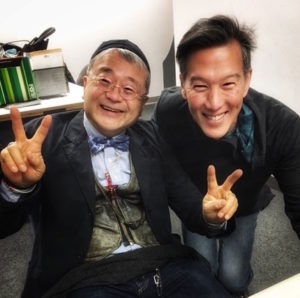COUNSELLOR’S CORNER: Accept Yourself and Like Yourself :)
Takanori Kuge, JSS Counselor
 “Whether or not & how much you accept yourself as you are = self-acceptance.”
“Whether or not & how much you accept yourself as you are = self-acceptance.”
“Whether or not & how much you like yourself as you are = self-affirmation.”
These equations are key indicators when assessing someone’s level of mental wellness. Generally speaking, people with high self-acceptance and self-affirmation are able to maintain healthier mental states than those who with low self-acceptance and self-affirmation. In a sense, self-acceptance and self-affirmation are like the immune system for mental health.
High Self-Acceptance and Self-Affirmation
Examples of self-recognition among people with high self-acceptance and self-affirmation are: “I think I’m cool.” “I feel I’m an overcomer.” “I believe in myself.” “I’m a proud geek.”
Low Self-Acceptance and Self-Affirmation
Examples of self-recognition among people with low self-acceptance and self-affirmation are: “I’m nothing…” “I shouldn’t exist…” “I’m garbage…” “I always screw up things up…”
As our physical immune system tries to protect us from germs and viruses, our mental immune system helps us fight with various stressors in our lives.
For instance, the stressor is finding out that Ms. Jane Doe, a member of your social group, has been baselessly gossiping about you behind your back. This situation would be unpleasant and stressful for anyone, however, how much negative impact the stressor would have on you depends on how mentally immune you are. There will be a large discrepancy between the stressor’s negative impact on people who are highly mentally immune (HMI) and those who are low mentally immune (LMI).
People who are HMI would think:
“What the…. Well, but I didn’t do anything to be ashamed of, so I will just stand tall.”
“Okay. I’ll discuss it with Jane in-person.”
“That’s all Jane does all the time. I kinda feel sorry for her.”
“I’m fine if she doesn’t like me. That’s not my problem.”
This way, the HMI people can minimize the damage from the stressful incident, so that it takes only a short time for them to recover from the damage.
Conversely, those who are LMI would feel like:
“They don’t like me because I’m hopeless… I cannot even have a friend…”
“Oh, I hate myself… I must have done something bad to Jane…”
“I cannot see them any longer… I must stop going to the group…”
“I know nobody like me…”
With these self-defeating thoughts and beliefs, the LMI people unconsciously amplify the damage from the stressful incident, so that the damage becomes bigger and more long-lasting.
Many scientific and medical researchers have proven that mental health and physical health are closely connected. In order to enjoy our lives, we have to handle and deal with a multitude of stressors one after another. Having a strong mental immune system is key to being resilient.
In the next issue, I will introduce how to make your Mental Immune System stronger with concrete examples.
Let’s enjoy the rest of the snowiest and coldest winter in the last several years!


